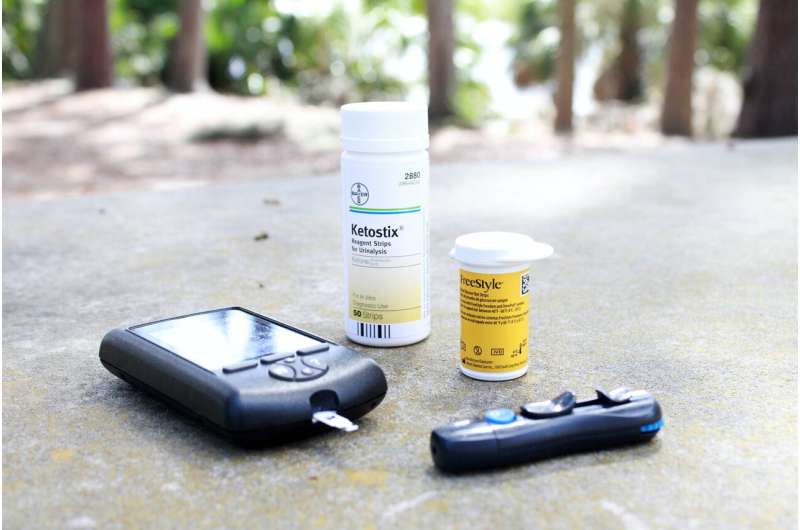This article has been reviewed according to Science X's editorial process and policies. Editors have highlighted the following attributes while ensuring the content's credibility:
fact-checked
peer-reviewed publication
trusted source
proofread
Study hints at tools to prevent diabetes associated with antipsychotic medications

New University of Pittsburgh research points to a potential approach to reducing the risk of diabetes associated with widely-prescribed antipsychotic medications.
The study presents early evidence in support of co-administering antipsychotic medications that block dopamine receptors in the brain alongside drugs that stop antipsychotics from blocking those same receptors in the pancreas. This approach, published in Diabetes, could limit metabolic side effects, including impaired control over blood sugar, or dysglycemia.
This research may also explain why weight control medications, including new neuropeptide drugs Wegovy and Ozempic, may not be as effective as hoped in controlling dysglycemia caused by antipsychotic drugs. Patients who are experiencing the weight gain associated with antipsychotic medications might be tempted to take these new drugs to control satiety—but they may miss an important underlying cause of the drug-induced deglycation.
"Antipsychotic medications don't just stop working below the neck," said senior author Zachary Freyberg, M.D., Ph.D., associate professor of psychiatry and cell biology at Pitt's School of Medicine.
"Maintaining glucose metabolism requires the brain to be in constant communication with the rest of the body, and vice versa. Next-generation antipsychotic drugs can be modified as a new strategy to control dysglycemia and diabetes."
Most prescription antipsychotic medications work by blocking the class of brain receptors that respond to a neurotransmitter called dopamine—a cornerstone molecule of the brain's reward system and brain-directed movement control. However, the subtype of dopamine receptors that respond to antipsychotic medications, called dopamine D2 receptors, are not exclusive to the brain.
As Freyberg's earlier research has shown, antipsychotic medications also block D2 receptors in the pancreas.
Freyberg's dogma-breaking discovery highlighted that pancreatic dopamine plays a key role in controlling blood sugar by interacting with D2 receptors on the surface of pancreatic cells that control production and secretion of hormones insulin and glucagon. When the fragile balance between glucose-raising and -lowering hormones is destabilized by antipsychotic medications, dysglycemia and diabetes may follow.
However, peripheral dopamine signaling can be harnessed for therapeutic good. In collaboration with researchers at the National Institutes of Health's National Institute on Drug Abuse (NIH NIDA), the team created a molecule that can limit antipsychotic drugs from blocking D2 receptors in organs like the pancreas, but not in the brain.
This molecule, called bromocriptine methiodide, or BrMel, is structurally similar to bromocriptine—an FDA-approved drug to treat type 2 diabetes—but has a modification that makes it less likely to pass through the brain-blood barrier if administered systemically, therefore limiting its activity to the periphery.
Early studies in mice suggest that dopamine's effects on glucose metabolism require communication between the brain and the peripheral organs including the pancreas.
Experiments have shown that, unlike systemically administered bromocriptine that improves the glucose profile of insulin-resistant mice, peripherally-limited BrMeI, or bromocriptine delivered directly to the brain, failed to show improvements. Drugs like BrMeI that can stop antipsychotic medications from acting on peripheral targets may therefore be useful in preventing, or even reversing, dysglycemia.
Freyberg and his collaborators at Pitt are in the early stages of a safety clinical trial to ensure that the therapeutic effects of antipsychotic drugs are preserved when these psychiatric medications are administered in tandem with bromocriptine since it is already FDA approved. They hope to launch a bigger trial to test the efficacy of BrMel and similar molecules for limiting dysglycemia in the next several years.
"The fact that both the brain and the body are required to maintain stable glycemic control provides a novel dimension in understanding neuropsychiatry and begins to integrate disparate pieces of knowledge about different organ systems into a coherent whole," said Freyberg.
"The majority of psychiatric medications are prescribed by general practitioners and not psychiatrists," he added.
"We hope that our research builds awareness about the importance of communication between the brain and the rest of the body in maintaining physiological functions and reminds clinicians that they should also consider that drugs designed to act on targets in the brain, like psychiatric medications, may also have significant actions outside of the brain when making prescription recommendations."
More information: Development of novel tools for dissection of central versus peripheral dopamine D2-like receptor signaling in dysglycemia, Diabetes (2024). DOI: 10.2337/db24-0175





















